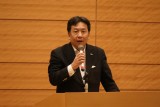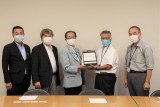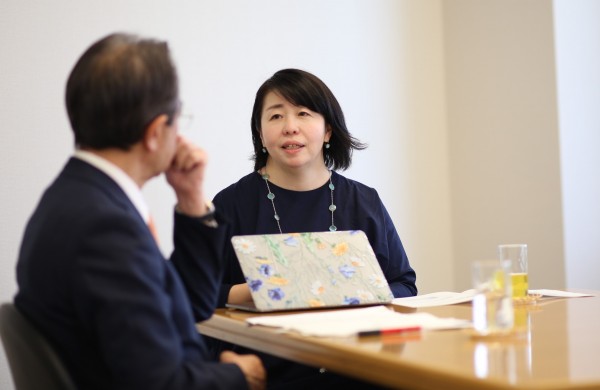2020年5月30日
Announcing the Proposal, "Towards a Society of Mutual Support: Politics and the Post-Corona Society (A Government that Protects Lives and Livelihoods)"
Full Text of Press Conference:
At a press conference on May 29, Leader of the Constitutional Democratic Party of Japan (CDP) Yukio Edano announced his personal proposal, "Towards a Society of Mutual Support: Politics and the Post-Corona Society (A Government that Protects Lives and Livelihoods)." The full translation of his opening remarks is as follows.
Leader Edano’s Regular Press Conference May 29, 2020
■Issues exposed by the Novel Coronavirus (COVID-19)
I will announce my current thinking in regards to politics in the post-corona society, under the title “Towards a Society of Mutual Support."
I believe we are facing a critical phase in regards to COVID-19 and the socioeconomic crisis it is causing.
In that sense, the term post-corona may not be accurate. However, without being conscious of the significant problem that we have been confronted with as a result of COVID-19, as well as the social problems revealed by the crisis, I do not believe it will be possible to sufficiently protect lives from the contagion once again, or to protect livelihoods from the socioeconomic impacts.
Unfortunately, the government's response to this point has been very reactive, and the scale of response measures too small compared to the reality of the situation. I believe that the absence of a clear, big picture perspective is one of the key factors for this insufficient response.
This is why I have titled my presentation "Politics and the Post-Corona Society." This is exactly the kind of big picture perspective we must hold when we are tackling COVID-19 measures, keeping in view perspectives towards the next era of society. Therefore, I believe it is necessary to raise these questions to the public at this stage.
I am certain that the essence of the ideas I am about to propose, while perhaps with different expressions or formulations, are shared with all those who hold distrust and uncertainty toward the Abe administration and look forward to a government that will replace it, and with the wide range of people seeking to replace the current LDP-Komeito coalition.
Therefore, I believe that the concepts of “politics in the post-COVID-19 society” and a “society of mutual support” are our departure point for initiatives to conceptualise a new government to replace the LDP-Komeito ruling coalition; a government that will protect lives and livelihoods.
The concept of "Towards a Society of Mutual Support" that I am about to announce has not been discussed within the CDP as a party yet. It is therefore not an official, authorised concept of the party.
It is a call and a proposal I would like to personally make to all of you, both within and outside of the CDP, as the leader of the largest opposition party, which holds the responsibility of aiming to become the next head of government.
This is our departure point, our starting line. I look forward to receiving diverse opinions and suggestions from a wide range of voters around the country, so that we can finalize the concept of our government by the time of the announcement of the general election.
What I will present today will be the principles. I believe that many concrete policies, methods, and processes for realising these principles have already been put together and proposed both by the CDP and like-minded or broader opposition parties.
While consolidating these, we intend to develop further concrete policies, measures, and processes by the announcement of the general election.
■The Vulnerability of Excessively Small Governments
I believe that COVID-19 has confronted us with the weaknesses, vulnerabilities, and problems of modern society and the economy, and of political administration.
The first is vulnerability in political administration, the second is vulnerability from socioeconomic aspects, and the last is problems in the fundamental nature of society.
Firstly, as a result of the recent slogans and propaganda, "from the public to the private sector," and "what the private sector can do, the private sector is to do," governments have become “excessively small” and their vulnerability is becoming obvious.
The reason I do not say “small government“ is that the government is not necessarily small in terms of the size of its budget. The problem is not the size of the finances, but that the institutions and people responsible for public affairs, regardless of their form, are too small and vulnerable.
For one thing, we are facing the reality of a critical shortage of human resources.
Many health centers across the country have been working tirelessly to respond to the endless calls for consultation and the increasing number of infected people, resulting in a serious lack of sleep and rest.
Local government officials have been working tirelessly regarding the 100,000 yen flat benefit; however, in many cases the application forms are just finally reaching people, or have not even been delivered yet.
As a result of leaving it up to the private sector, some people have not even heard any response despite having submitted their applications for benefits online on May 1, the day they opened.
We are now faced with a situation where the public organisations that should be handling the necessary administrative work have critical shortages of human resources.
Second is the lack of clarity in the command structure.
There is still no cross-agency command center. Indeed, the Ministry of Health, Labour and Welfare was playing the central role. Yet now, in order to prevent the spread of infection, all ministries and agencies must consider what they can do, and responses must be in place so that they can address that. However, looking at the second supplementary budget announced the day before yesterday, it cannot be said that there is a firmly managed policy for a cross-agency response, and still different messages are being sent from within the government.
I have personally conveyed to Prime Minister Abe during a meeting of Party Heads that based on my own experience, a firm command post must be created and that information should be centralized there. Yet despite this, such a structure has unfortunately not been created.
Thirdly, there has been a critical lack of capacity for information consolidation and administrative processing.
Many people are seeking information on the status of infection and how many PCR tests have been carried out. Unfortunately, until just the other day, the method to gather this kind of information was reports from the public health centers made on paper or submitted by fax.
The confusion mentioned over the 100,000 yen benefit clearly shows issues regarding the My Number System. This was introduced with a ringing endorsement, and the government has been working to expand its scope of coverage and use. Yet, it has become clear that there was not even a basis created for the system to function in administration.
Unfortunately I believe that this system has led to various countermeasures being delayed or put on the sidelines.
I became keenly aware of these vulnerabilities through the Great East Japan Earthquake and Tsunami and the subsequent Fukushima nuclear power plant disaster.
Since then, I have appealed to break away from this excessively small administration, and the COVID-19 outbreak, which can be called a nationwide disaster, has finally made clear the necessity of a major 180-degree turnaround from this policy.
■The Vulnerability of the Neoliberal Society
During this period, our society has been driven by an emphasis on self-responsibility and a drive for competition and efficiency.
We have been running a so-called “neoliberal” economy and society, and its vulnerabilities have become clear through this crisis.
One is the extreme vulnerability of care services, in the broad sense, which are essential for survival. Japan's medical system, which had been under pressure to be extremely efficient and was on the edge, faced the crisis of this infectious disease and was pushed to the brink of medical collapse.
In addition, if it could be said that broad essential care services such as aged care, child care, after-school children’s clubs, and welfare services for people living with disabilities, could continue somehow without collapsing, it is because they were supported by the strong sense of mission of the individuals engaged in each of these sectors. I do not believe it is an exaggeration to say that as a system, they have already collapsed.
Second, our society is vulnerable in that this social crisis, COVID-19, is directly linked to crises in each individual life.
Non-regular and precarious jobs have recently increased dramatically. In a sense such people can be easily fired, or can lose their jobs easily. In many cases losing their jobs can mean having to leave work dormitories, thereby losing their homes. This is an extremely vulnerable structure that can quickly lead to homelessness.
Households with zero savings, which have dramatically increased in recent years, are unable to make ends meet when a crisis arises; when they have difficulties in generating income that directly impacts their livelihood itself. The percentage of those structurally forced into such a situation has increased significantly.
Third is the vulnerability of socioeconomic structures caused by the emphasis on short-term efficiency.
Excessive concentration, again in densely populated areas with large populations, has led to an increased risk of cluster outbreaks and expansion of infection.
An excessive international division of labor has forced us to rely on imports for items essential for living and for protecting lives; this is exemplified by the lack of masks. We have been confronted with such shortages.
At this stage these shortages have not impacted food or energy; however if COVID-19 continues to spread around the world and the situation worsens, we may also be faced with, for example, difficulty in importing food.
One further thing brought about by this emphasis on efficiency is that while relying upon small and medium sized enterprises (SMEs), the business base for such enterprises is too vulnerable. Inbound and international tourists, for example, are supported by SMEs in the fields of tourism or transportation, many of which are in the midst of a financial crisis.
Many subcontractors and sub-subcontractors in the manufacturing industry that supports Japan’s supply chain are now in danger of going out of business.
Even if large companies are able to maintain their operations, if the SMEs collapse, the supply chain and the detailed aspects of the tourism industry would also collapse, and it would be impossible to return to the original state.
SMEs have been asked to make too many cost-cuts and to seek excessive efficiency in order to run the Japanese economy, and there is no spare capacity at all.
In a sense, we are now being confronted with visible and concrete vulnerabilities, as well as the necessity to renew the way we think of society as a whole,
■The Philosophy of a Post-COVID Society
Each of us has made all efforts to protect ourselves and the lives of our loved ones from COVID-19, and to avoid infection. These efforts have ultimately led to the prevention of the spread within society, and through this, we have reaffirmed that society is built upon mutual support and aid.
I often use the adage, “the good you do for others, is good you do yourself.” I think many have realised during this crisis that this is the essence of society, that what we do for ourselves is ultimately for the benefit of others, and what we think we do for others is also to our own benefit.
On the other hand, I am sure that the crisis has also caused many people to realise that the concept of “self-responsibility” is indeed an empty theory.
In relation to the virus – the virus does not choose people.
No matter how rich you might be, or how high your social status, you cannot protect yourself in a situation where the contagion continues to exist in the world.
If someone is rich enough to spend all day, 365 days a year, without any contact with any other people, they might, through their own efforts alone, be able to protect themselves from being infected 100%. However, this would mean completely cutting off their activities as a person within society.
Maintaining contact with other people but avoiding contagion is not something that can be done only with your own efforts.
This pandemic has demonstrated that the theory of “self-responsibility” is actually not correct.
We were made to recognise that supporting each other, not just on our own but for the sake of each other, is ultimately for the good of society and those around us. At the same time, however, we have also realised through this situation that the risks and costs of doing so are unevenly distributed among us as individuals.
The risks that arise through the crisis are represented by the fact that health care professionals treating those with the virus, amidst overwhelmingly high risks of infection, are working to do all they can to prevent the spread of contagion.
The term "essential worker" is often heard recently in regards to various fields, such as nursing care, childcare, after-school children's clubs, welfare for people living with disabilities, and transportation. While the risk of infection may be lowered by working remotely and staying at home, society will not function with such essential workers doing so. There are significant differences in the risk of infection according to each social role or job.
There is also a great difference in the cost burden of protecting society from the crisis.
Industries such as tourism and restaurants have seen their income fall to almost zero in this period. In addition, for example, the tourism industry, especially inbound tourism, will be forced to suffer reduced income for quite a period to come.
This is exactly the burden and cost they are forced to bear in order to prevent the spread of contagion in society overall. At the same time, there are some other jobs that are even increasing their income under these circumstances.
However, unless everyone does all they can in order to prevent the spread of contagion, we will not be able to protect lives. Unless we are able to redistribute according to the differences in risk or cost burden, it will become unbearable for those working in high-risk jobs or those in industries with a high burden.
And, the risk of infection has been reduced because many people have been bearing these costs or risks. If that is the case, such risks and costs need to be shared and redistributed, and only politics can do that.
■The Social, Economic and Political Direction of the Post-COVID Era
Therefore, the society we are to create from now must break away from the excessive self-responsibility theory of the past, and move to a society of mutual support.
We need to transform from an economy which is obsessed with short-term things such as self-responsibility, competition, and efficiency; to an economy that is forward-oriented, low-risk, and decentralised.
Thirdly, we must break away from a government that is excessively too small, and the mistrust towards it, and instead create a government which can be trusted, and which is fully functioning.
We will create such a mutual support society, a forward-thinking and decentralised economy, and a trustworthy and functioning government, through replacing the LDP-Komeito ruling coalition.
The COVID-19 crisis has led to the tragic loss of many lives, and many people’s livelihoods are facing extreme difficulties.
I am certain that we will be able to forge a new era, in which those facing such difficulties can break away from such circumstances as soon as possible, so that society overall can live with a sense of security and hope for tomorrow.
On the basis of such a belief, and with the opinions of and discussions with a broad range of people, I pledge to establish a new government to replace the LDP-Komeito ruling coalition.

















